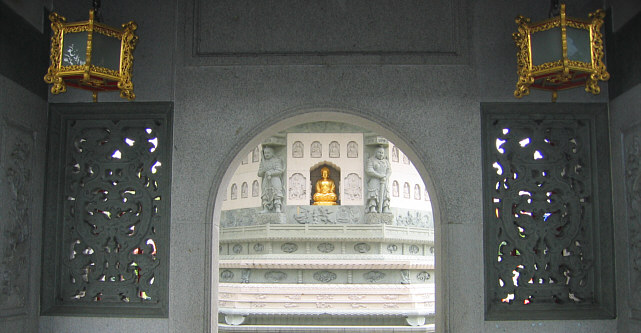Life’s highest blessings
SINCE the Buddha’s days, Paritta chanting has become a common practice to shield us from the influence of evil spirits, misfortune and sickness. More importantly, chanting the text reinforces in our mind confidence in the Buddha and the Dhamma, and encourages us to remain virtuous and caring in our conduct.
The Buddha recommended a number of Suttas (sutras) with protective verses for chanting. Traditionally there are 11 Suttas altogether, known collectively as the Great Parittas, that are being chanted every day by all monks as well as many devotees. Chanting is done in the original Pali language.
Many of the suttas also contain exhortation to practise virtuous conduct. In the Mangala Sutta, for instance, the Buddha lists the kind of blameless conduct, useful professions and charitable interaction that we ought to follow, in order to attain life's highest blessings.
Conditions for chanting
1. You should have learnt to chant the Suttas correctly and fully, with no omission.
2. You must understand the meaning of the text that you are chanting.
3. Your heart must be filled with goodwill and lovingkindness when chanting.
For the listener
If you are not chanting but listening, you must listen with attention and respect. And you must be confident that the chanting will ward off dangers and bring good results to you. To have confidence, you must maintain Right View as taught by the Buddha. And finally, you must not be guilty of horrific crimes such as killing your parents or a monk, or causing conflict among members of the Sangha.
When the blessings do not materialise
A chanting session is a giving and receiving session. If you are listening, you are at the receiving end of the blessings. But if you are not paying attention but thinking of something else instead, then obviously your mind is not present to receive any of the blessings being invoked. So, chanting won't work for you in such a situation.
Internalising the text
If we memorise well the Mangala Sutta text, and chant it regularly, then Buddha's admonitions will be absorbed into our mind, and internalised. The result will always be inward happiness and peace throughout our life. This surely is life’s highest blessing.
Mangala Sutta on the highest blessing
Not to associate with fools, to associate with the wise, and to honour those who are worthy of honour. This is the highest blessing.
To live in a suitable place, to have done meritorious deeds, and to keep one's mind and body in the proper way. This is the highest blessing.
To have much learning, to be skilled in crafts, to be well-trained in moral conduct, and to have speech that is well-spoken. This is the highest blessing.
To care for one’s mother and father, to support one’s spouse and children, and to have work that causes no confusion. This is the highest blessing.
To give, to practise what is good, to support one’s relatives and to carry out blameless action. This is the highest blessing.
To abstain from evil in mind, body and speech, to abstain from intoxicants, and not to be negligent in good deeds. This is the highest blessing.
To be respectful, humble, contented, and grateful, and to listen to the Dhamma on suitable occasions. This is the highest blessing.
To perform practices that consume evil states, to lead a noble life, to see the Noble Truths and to realise Nibbana. This is the highest blessing.
To possess the mind that does not flutter when confronted by worldly circumstances, but remains sorrowless, stainless and secure. This is the highest blessing.
Those who have fulfilled these things are invincible and enjoy true happiness everywhere. This is the highest blessing.
